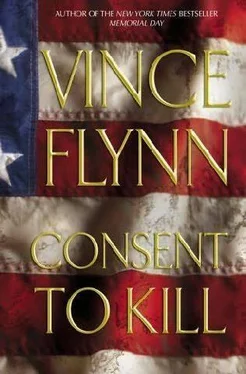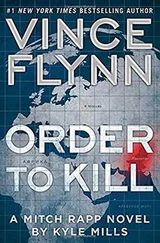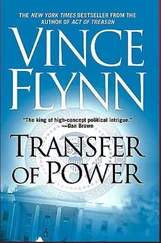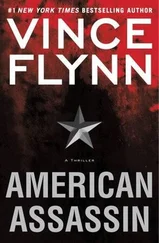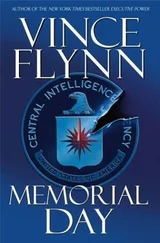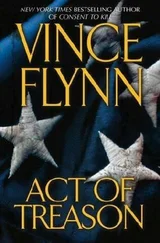She reached the outer door to the situation room and punched her code into the cipher lock. She opened the heavy door and ignored the duty officer who was sitting behind a desk a few paces ahead. Kennedy turned to her left and entered the soundproof conference room, where she was surprised to see two individuals sitting at the far end of the long, shiny, wood table. Before she had a chance to address them, the president entered the room and closed the door. The two men attempted to stand, but the president told them not to bother.
Kennedy assumed Senators Walsh and Hartsburg had been asked by the president to come to this meeting. As to why, she hadn't a clue. Instead of sitting in his normal chair at the head of the table nearest the door, Hayes walked to the other end of the room and grabbed the chair next to Senator Hartsburg, "Irene, have a seat."
Kennedy took her place and the president walked around the table and sat next to Senator Walsh. Hayes leaned forward and placed his forearms on the table. "Irene, I'm sorry you had to sit through that."
Kennedy was rarely caught off guard, and she rarely allowed anger to get the best of her, but today was a day of firsts. "Mr. President, would you mind telling me just what in the hell is going on?"
"Irene, there isn't a proverbial snowball's chance in hell that the explosion was an accident. You know it, I know it, and they know it."
"Then why are you allowing them to put Mitch on ice and cut the CIA out of this?"
"I'm not."
"That's not what I just heard upstairs."
"Irene, what do you think Mitch is going to do when he's well enough to get out of bed?" the president asked.
Kennedy knew the answer, but was reluctant to respond to the question.
Senator Hartsburg coughed and said, "He's going to kill anyone who had anything to do with his wife's death."
"That's right," said the president, "and I can't say I blame him."
"Then what's this nonsense about revoking his passport and putting him under protective custody?"
"Not my idea." Hayes shook his head. "And what does it really matter? You and I both know there's no stopping him. Passport or not…he's going to leave the country and go wherever he damn well pleases."
"Mr. President, I'm confused. Mitch has sacrificed a great deal for this country. I think there is a better way to handle this than treating him like a criminal." Kennedy shook her head in disgust. "To be honest, sir, after all Mitch has done for you, I would have expected you to stand by him when he needs you most. Not cave into the demands of a few cabinet members."
Hayes took the rebuke surprisingly well. He sat back and looked at his two former colleagues from the Senate and then slowly returned his gaze to Kennedy. "I'm going to let you in on something that only a handful of people know, but first I need your word that you will not discuss this with anyone."
Kennedy looked at him intently. "Of course."
"I've decided not to seek reelection."
Kennedy's eyes opened a bit wider upon hearing the shocking news. With a little more than a year left in his first term, and a solid approval rating, there wasn't a person in town who had even mentioned the possibility of Hayes not seeking a second term. "Do you mind my asking why, sir?"
"I have some health issues that I think preclude me from serving as president."
Kennedy wanted to ask what those health issues were, but knew it could be personal. "I'm sorry, Mr. President."
Hayes glanced up at the clocks on the far wall and then said, "Parkinson's. It runs in my family. My mother's side."
"But I haven't noticed any signs."
"They're there. Trust me. I've been taking medication for five months. At first the results were good, but over the last few weeks things have gotten worse. My doctor tells me I should have no problem serving out my first term, but any hope of a second term would be purely selfish."
"But Parkinson's…"
Hayes shook his head. He'd studied every side of it. He'd discussed it with his wife until they had beaten the subject to death. Was there a chance he could stay on top of his game for four more years? The answer was maybe, and maybe wasn't good enough. And then there was the other issue of his physical appearance. That was the thing that really decided it for him. Hayes smiled and said to Kennedy, "The man in charge of the word's most potent nuclear arsenal cannot be seen standing at a podium with shaky hands."
Kennedy blinked slowly and glanced at the other two men. They all knew he was right, and admired him for making the difficult decision. There were others who would not have relinquished the mantle of power so easily. "Mr. President, I'm very sorry."
"Don't be. This office is bigger than any single person. It's been my honor to serve." Hayes regarded his two old friends from the Senate. Walsh smiled, Hartsburg frowned, and they both nodded. The two career politicians would have gladly settled for one term. Not one to feel sorry for himself, Hayes changed the subject. "Irene, let me lay things out for you. I have a vice president who is in over his head, I have a deeply flawed attorney general, a secretary of state who is more concerned with appeasing foreign governments than protecting our own long-term national security, and I have a new director of National Intelligence who will probably throw a party when he learns that I have Parkinson's." Hayes gave Hartsburg a sideways glance. It was Hartsburg who had recommended Ross for the top intelligence job.
The gruff senator said, "Bob, he's an ambitious fellow, but I wouldn't go so far as to say he's going to celebrate your misfortune."
"Okay, he'll celebrate his own opportunity."
"He's off to a bit of a rocky start," Hartsburg conceded and then looked to Kennedy. "Don't worry. We'll have a talk with him and get him settled down."
"The point is, Irene," the president said, "that I don't plan on spending my last year in office refereeing battles between my cabinet members. They sprang this one on me this morning," Hayes shook his head, "I should have seen it coming, but I didn't have a lot of time to prepare for it. As it is, I don't agree with them, but I do see their point."
"I'm afraid I don't, sir."
"We are a civilized country ruled by laws. We are constantly preaching to other countries about free speech, due process, and fair and just courts. It is one of the most important missions of the State Department. Here at home, our Justice Department and the courts are tasked with keeping things fair. A crime has been committed on American soil. Yes, it was perpetrated against an employee of the CIA, but the jurisdiction still falls squarely in the lap of Justice, and there is nothing any of us can do about that."
"Irene," said Senator Walsh, "there's another angle to consider. Mitch's wife was a fairly well-known reporter. The press is going to follow this story closely. The Justice Department would much rather announce that this was an accident, that way they won't have to set the bar too high for themselves. They'll quietly continue to investigate, but my guess is they will not classify it as a crime unless they have a suspect they can pin it on."
"That explosion was not an accident."
"We all know that," answered Hayes.
"Then what are we going to do about it?"
"Let me be very clear about this." Hayes placed his forearms on the table and clasped his hands. "I want whoever did this brought to justice, and I want it to happen quickly. I don't want an investigation that goes on for years, and I don't want to see a single person dragged in front of a court unless there is absolutely no other alternative."
"What about the Justice Department?"
"Let them run their official investigation." Hayes waved his hand as if the massive Justice Department were some inconsequential nuisance. "You and Special Agent McMahon have a good working relationship. Anything he finds I want him to pass on to you, but to be honest, I expect you to be way out in front of him on this."
Читать дальше
